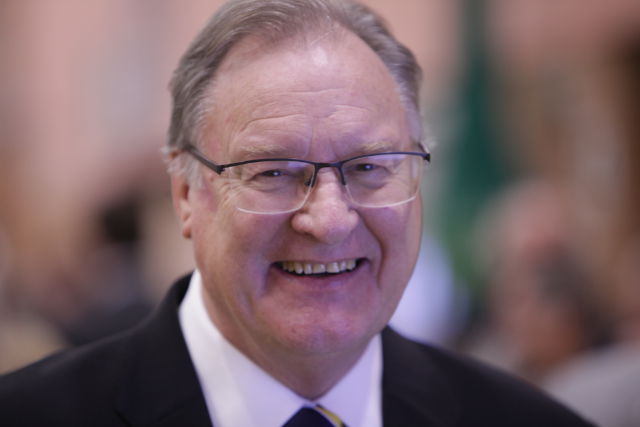The Isle of Wight Conservative administration have revealed their budget proposal for the coming year 2020/21.
The plans will see £4.5m of ‘savings’ in 20/21, with forecast ‘savings’ of £3.5m for each of the following three years, 21/22, 22/23, 23/24.
Hutchinson: “Never known so many uncertainties”
Due to the General Election and Brexit, the budget plans are being presented far later than in the previous two years, with deputy leader and cabinet member for resources, Cllr Stuart Hutchinson (pictured), saying he had, “never known so many uncertainties”.
There is no positive outcome yet from the Government’s Fairer Funding Review, IWC are hoping for an extra £1.5m but won’t know until later this year if successful, and any Island Deal (possibly bringing with it £6.4m) has yet to be agreed by the new Government. The council say that commitment made by Prime Minister Boris Johnson prior to the election will continued to be pushed.
Rise in council tax
If the budget plans are approved by the full council on 26th February, Islanders will see a council tax rise of 3.99 per cent, 2 per cent of which will go directly to help fund the ever-growing adult social care budget of £56.1m. This equates to an extra £1.04 per week for a band C council tax payer.
Council tax income makes up 56 per cent of the £159m budget. Business rate income makes up 24 per cent of the budget and the remainder comes from government settlement grants and income generation.
Business rates
The Isle of Wight council were previously involved with a Government pilot scheme that saw them retain 100 per cent of business rates received – around £1.8m per year.
All pilot schemes have now been scrapped and in this current year the percentage IWC could retain was reduced to 75 per cent and for 20/21 this will be reduced to 50 per cent, meaning the council have make up a shortfall of £900,000.
No job losses
No redundancies are expected for the 1,400 staff at the Isle of Wight council. Cllr Hutchinson explained that staff pay awards have been built in at 2 per cent (roughly the same rate as inflation), but that unions were calling for a 10 per cent pay increase.
Leader of the council, Dave Stewart, said the number of staff at the council was around one third less than five or six years ago.
Zero overspend in current budget
Cllr Stewart explained that through ‘efficiency savings’ the current budget, which had previously forecast an overspend of £1.2m, will now come in at zero, putting the council on a “financially sound basing”.
Explaining the reserves
CEO of the council, John Metcalfe, explained that throughout the year the “budget is a moving feast”, but no money is being taken from the general reserves this year. The council’s minimum reserves were reassessed 18 months ago and raised from £5m to £7m. The current reserves are around £12m.
Cllr Hutchinson equated that to the scenario of a couple both earning around £25,000 each, but maxed out on credit cards, one of them losing their job and having £500 in the bank between them.
Stewart: “Money comes in many different ways”
During a media briefing earlier today the councillors reinforced that “money comes into the council in many different ways”, not just through the annual grant settlement, but also through other grants which are ring-fenced for specific projects, such as the St Mary’s roundabout works.
Treasury Management staff were praised for their hard work and cautious, but optimistic approach. Cllr Hutchinson said without them being on top of financial matters, adult social care and children’s services would be under greater pressure than they are.
The papers
See the budget papers below. Click on the full screen icon to see larger version.
Image: © With kind permission of Allan Marsh





